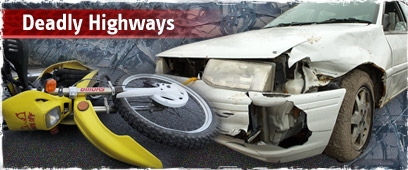

Dear readers,
Ynet would like to invite you to take part in an unusual media initiative: A sober discussion about life and death – our life and death.
We've decided it is time to dedicate a day of public soul searching to the toll road accidents take on our country. A day for us to try and understand how is it that after more than 30,000 people have lost their lives and hundreds of thousands of others have been hurt, we have yet to take to the streets and demand something be done on a national level.
We have to do everything – EVERYTHING! – in order to make sure this deadly disease, which is threatening our lives, is cured. We have to do everything to prove that as citizens – as a society – we are committed to ensure both we and our children find our way home safely. Today, tomorrow and always.
We will visit the subject of road accidents and effect it has on our lives from various aspects, as we try to examine the broader effect accidents have on the victims and their families; and explore the terrible financial, social, infrastructural, national and most importantly personal price, they inflict.
The media's nature is to shine a light on the new and unexpected rather than on the mundane. The nature of the Israeli news cycle is one which never really allows us to elaborate about anything outside its immediate context. It seems, however, that we do not need a special occasion to warrant this discussion. The Israeli reality has proven that the subject of road accidents is always relevant.
The awful truth
More than 30,000 people have been killed in road accidents since the Israel's establishment. The exact figures change daily, but the last week of 2007 noted that Israel's highways have claimed 29,679 lives. More than all the fatalities claimed by all the wars Israel ever fought, and all its terror victims, put together.
The problem with such figures is that they are unfathomable. They're hard to process and comprehend, and they may eventually perpetuate indifference, since none have us know hundreds of victims personally. But each and every one of us knows of at least one person who lost their life this way. The "Israeli" nature of things has had all of us become a part of this bereaved family, which is constantly, and terrifyingly, ever-expanding.
Thirty-thousand dead. This figure becomes even more monstrous with respect to a country our size: More than the entire population of Safed, twice the number of people living in Ariel, the same number as the fans who came to the last Israel-Switzerland soccer game in Ramat Gan Stadium last week. It is truly inconceivable.
But that is just the bottom line, which still hides an even more horrific blood price, of hundreds of thousands of people who were injured, many severely; millions of family members and friends who ache. Many of us are members of the victims' immediate circle. All of us are members of their secondary one.
We have become jaded. Numb to these figures, which seem so much a part of modern life in an evolving country. We have become resilient to the reports, in the hopes that it will never happen to us, because that is what it means – that is what it takes – to be an Israeli: That is how we have survived wars, grown accustom to our southern communities being bombarded with rockets and went through years of buses exploding in the streets. We're torn apart inside, we cry and light candles. And then we move on.
Fact and figures
Hillel Posek, the editor of Ynet's Motor Channel, alerts us all to the following: Israel is ranked eighth in the world, when it comes to road accidents' fatalities (in ratio per one million citizens). Considering that we have a significantly lower number of vehicles on our roads (nearly 50% less) than other Western counties, we actually rank higher.
Contrary to popular belief, the No. 1 cause of road accidents in Israel is drivers who disobey traffic lights. Speeding only ranks in eighth place.
Each fatality "costs" the State NIS 4.7 million ($1.3 million). The cost of caring for casualties ranges from NIS 17,000 to NIS 900,000 ($4,700 -$251,000), depending on the extent of their injuries.
Some 430 people were killed in road accidents in 2007, as a cost of NIS 2.21 billion ($613.05 million) to the State. The fatalities noted in 2006 cost the State NIS 11.6 billion ($3.214 billion).
And we keep paying in silence. We're used to it.
We can make a difference
We’ve chosen to do this now, in the early days of September, which mark the beginning of the new school year, with the safety of one and a half million school children in mind. We've chosen to do this now, just before the High Holidays, to precede – even by a fraction – the traditional summaries and round-ups, the annual reports and self-righteous speeches by public figures – which are, at the end of the day, little more than a repeat performance.We also wanted to pay our respects, to honor the victims of the road, who have paid the horrific price of the inevitable: The thousands of citizens who met an unexpected, unheroic death. In the kind of combat-oriented society we live in, the lack of an official memorial day makes way for an apathetic void, and nothing spells a demise as meaningless as one caused by a car crash.
The victims remain nameless forever. No memorial acknowledges them, no perpetuation efforts are made to preserves their legacy and no one stands in attention in their memory.
We can tell you all about the reality, but only you are the ones who can change it. Drive safely, come home safely and please – never just accept a reality of inevitable death. This is not a matter of force majeure. We can change priorities, we can prevent this from happening – we can make a difference.
We dedicate this day to the memory of road fatalities and offer their families our sincere and heartfelt condolences.
Yours,
Jon Feder
Ynet Editor in Chief















